词汇 第4单元历年试题
- 格式:doc
- 大小:74.00 KB
- 文档页数:10
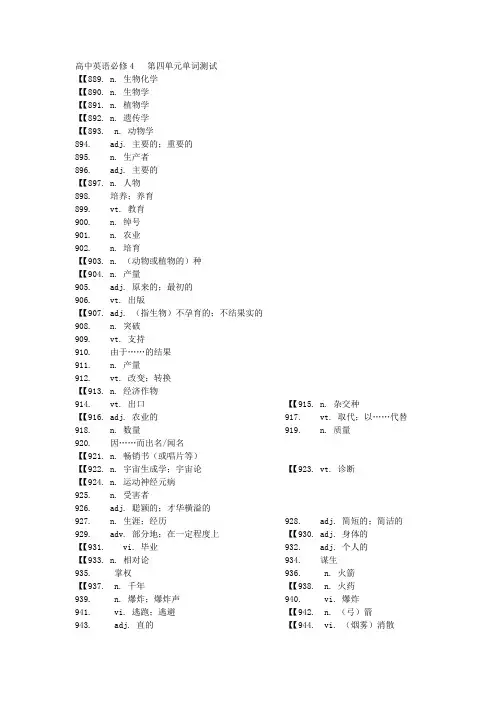
高中英语必修4 第四单元单词测试【【889. n. 生物化学【【890. n. 生物学【【891. n. 植物学【【892. n. 遗传学【【893. n. 动物学894. adj. 主要的;重要的895. n. 生产者896. adj. 主要的【【897. n. 人物898. 培养;养育899. vt. 教育900. n. 绰号901. n. 农业902. n. 培育【【903. n. (动物或植物的)种【【904. n. 产量905. adj. 原来的;最初的906. vt. 出版【【907. adj. (指生物)不孕育的;不结果实的908. n. 突破909. vt. 支持910. 由于……的结果911. n. 产量912. vt. 改变;转换【【913. n. 经济作物914. vt. 出口【【915. n. 杂交种【【916. adj. 农业的917. vt. 取代;以……代替918. n. 数量919. n. 质量920. 因……而出名/闻名【【921. n. 畅销书(或唱片等)【【922. n. 宇宙生成学;宇宙论【【923. vt. 诊断【【924. n. 运动神经元病925. n. 受害者926. adj. 聪颖的;才华横溢的927. n. 生涯;经历928. adj. 简短的;简洁的929. adv. 部分地;在一定程度上【【930. adj. 身体的【【931. vi. 毕业932. adj. 个人的【【933. n. 相对论934. 谋生935. 掌权936. n. 火箭【【937. n. 千年【【938. n. 火药939. n. 爆炸;爆炸声940. vi. 爆炸941. vi. 逃跑;逃避【【942. n. (弓)箭943. adj. 直的【【944. vi. (烟雾)消散。
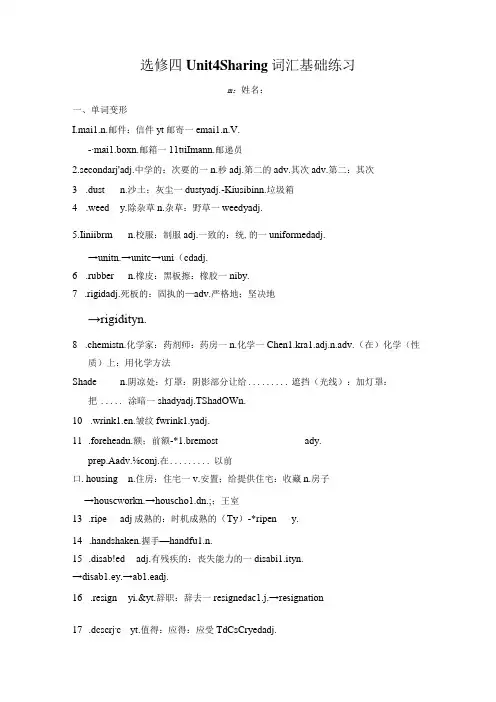
选修四Unit4Sharing词汇基础练习m:姓名:一、单词变形I.mai1.n.邮件:信件yt邮寄一emai1.n.V.-∙mai1.boxn.邮箱一11tιiImann.邮递员2.secondarj'adj.中学的:次要的一n.秒adj.第二的adv.其次adv.第二:其次3.dust n.沙土;灰尘一dustyadj.-Kiusibinn.垃圾箱4.weed y.除杂草n.杂草:野草一weedyadj.5.Iiniibrm n.校服:制服adj.一致的:统,的一uniformedadj.→unitn.→unitc→uni(cdadj.6.rubber n.橡皮:黑板擦:橡胶一niby.7.rigidadj.死板的:固执的—adv.严格地;坚决地→rigidityn.8.chemistn.化学家:药剂师:药房一n.化学一Chen1.kra1.adj.n.adv.(在)化学(性质)上:用化学方法Shade n.阴凉处:灯罩:阴影部分让给......... 遮挡(光线):加灯罩:把 ..... 涂暗一shadyadj.TShadOWn.10.wrink1.en.皱纹fwrink1.yadj.11.foreheadn.额;前额-*1.bremost ady.prep.Aadv.⅛conj.在......... 以前口.housing n.住房:住宅一v.安置;给提供住宅:收藏n.房子→houscworkn.→houscho1.dn.;;王室13.riρe adj成熟的:时机成熟的(Ty)-*ripen y.14.handshaken.握手—handfu1.n.15.disab!ed adj.有残疾的:丧失能力的一disabi1.ityn.→disab1.ey.→ab1.eadj.16.resign yi.&yt.辞职:辞去一resigned ac1.j.→resignation17.dcscrj,c yt.值得:应得:应受TdCsCryedadj.18.1.ate1.yady.最近:不久前:近来--Ia1.eadj.→1.a1.estadj.→1.attcradj.19.1nput n∙情况:信息:投入:输入yt.输入一n.产量,作品;产生V.输出20.c∞su1.ty.咨询:请教:商量一consu1.tationn.consu1.tantn.21.stabi1.ity n.稔定(性):稳固(性)一adj.安定的:平静的;稳定的adv.稳定的:坚固的22.prayv.企盼:祈祷一prayern.→prayerfu1.adj. ___________23.hypoιheιica1.adj假设的;假定的一hypoihesisn.(p1..hypotheses)→hypothesizey.二、单句语法填空!.Shefee1.sgui1.tyaboutspending1.esstime(最近)wiιhhertwokids.2.Inthefaceofhisphysica1.(disab1.e).hedoesn't1.oseheart.3.Togetsomeaccurateinformation.vou'dbetter1.akepartina(consu1.t).4.What(critcrion)arcusedforassessingastudent'sabi1.ity?5.TheO1.herdaythebankfina1.1.y(同意)af5001.oantome.6.Shewasafair1.y(固执的)ρe rs onwhohadstrongpersona1.views.7.Thetreesproyide(阴凉处)fortheanima1.sinthesummer.8.Theskinonherchecksandaroundhereyeswasbeginning1.o—(起皱纹).9.Thetrainwasahoutto!eaveandTwasnotevenonthe(站台).10.Bythemidd1.eofJu1.yyoushou1.dbegintohave(成熟的)tomatoestoeat.11.Practiceistheso1.e(标准)oftruth.!2.11ιeyhopetheta1.kwi1.1.bringpeaceand(稳定)toSoutheastAsia.B.we(祈祷)Iha1.shewou1.drecoyerfromheri1.1.ness.14.Youcan(与......... 订立合同)withustode1.iveryourcargo(货物).15.Doctorssaidhisconditionwasseriousbut(stabi1.ity).16.Wcmadea(巡回)θf1.heo1.dcitywa1.1.s.17.His (残疾)arosefromanaccidcnt.whichmadehim1.iveahard1.ife.18.Davidgivesthefin⅛t(咨询)freeofcharge.19.r11ιedoctoradvisedmetotakea(胶囊)thismorning.20.ThcSiitc1.1.itcwi1.1.beusedmain1.yto(转播)tc1.eyision programs.21.Eyerystudentshou1.dn'ttaketheirsafetyfor(grant).22.AIIthisinformationhadtobe(输入)into1.hccomputer.1.11don'tknowthetit1.ebutIrecognizethe(曲调).24.You ___ (值得)arestaftera1.1.thathardwrk.25.Wecou1.dheartheporridgebeginningto(沸腾).26.Mymothercanmakeade1.iciousmea1.withthe(剩余的)food.27.Themi1.kyoupouredoutinthe(茶碟)wasquick1.y1.apped(舔着喝)upbythecat.edmebackwithasmi1.eanda(握于∙).29.Sheriskedherown1.ifetosavea(残疾的)woman.3().Toensureyoursafety,youshou1.dchangeyourbroken(插头)atonce.31.Theotherdayhe(p1.ug)1.hcho1.einthepipewithano1.drag.32.His(disab1.e)prcvcntshimfromfindinganidea1.job.33.Sheresignedherjobforpersona1.reasons.34.Heisanoutstandingath1.eteanddeserye((win)inthe1.astgame.35.MrRona1.d(辞职)hisposition1.astmonthbecauseofhisi1.1.ness.36.Thewor1.dwi1.1.bedifferent,andwewi1.1.havetobepreparedtoadaptIhechange.37.Mostexpertsthinkthat1.ightindustryisc1.ose1.y(re1.ate)toagricu1.ture.38.Hegotupand(drag)hischairtowardsthetab1.e.cationshou1.dbeauniversa1.rightandnotprivi1.ege.40ΛVhethermidd1.eschoo1.Stidentsshoi1.dWearsch∞1.(制服)iSaninterestingtopic.参考答案一、单词变形1..ιnai1.n.邮件:信件vi.邮寄一emai1.n.电子邮件v.发电子邮件—♦mai1.boxn.邮箱-*mai1.mann.邮递员2.secondary adj.中学的:次要的一second n.秒adj.第二的adv.其次一second1.yadv.第二;其次3.dustn.沙土:灰尘一dustyadj.布满灰尘的"*duzbin n.垃圾箱4.wcα1.V.除杂草n.杂草;野草一WBdyMj.似杂草的,瘦弱的5.unifomιn.校服:制服adj.一致的:统一的一ιIni「ormed adj.穿制服的一unitn.单元Tuni1.e丫.(使)联合,(使)团结;统一一Uni1.ed Hdj.团结的,统一的6.mbbcrn.橡皮:黑板擦:像胶TrUbv,擦,磨擦7.rigid adj.死板的;固执的一rigid1.y adv.严格地:坚决地一rigidity n.严格;僵硬8.chemist n.化学家:药剂所药房一chcmis1.ryn.化学—chemica1. adj.化学的n.化学品一ChemiCMyadv.(i⅛)化学(性质)上;用化学方法9,shadc n.阴凉处:灯罩:阴影部分vt.给……遮挡(光线);加灯罩:把 .... 涂暗一shady adj.阴凉的,背阴的~*5adown.影子:阴影10.wrink1.en.皱纹一wrink1.y adj.有皱纹的:皱的11.forehead n.额:前额ff∂remosi adj.最前的,最重耍的adv.首先:最重;要地一beforeprep.&adv.&conj.it ...................... 以前12.housingn.住房;住宅一housev.安置:给提供住宅:收藏n.房子—♦houseworkn.家务一househo1.dn.家庭:家务:工室13.ripc adj.成熟的:时机成熟的(Ty1.riPCn v.(使)成熟14.handshakc n.握手一handfu1. n.一把一handyadj.手边的:方,便的15.disab1.edadj.有残疾的;丧失能力的一disabi1.ityn.残疾:缺陷:障碍一disab1.ev.使丧失能力,使无效一ab1.eadj.能够,有能力的16.resign vi.&vi.辞职:辞去一resigned adj.辞职的一rcsigna1.ion n.辞职17.desene V1.值得:应得:应受fdeserved a⅛∙值得的,应得的18.1.ate1.yadv.最近:不久前:近来一Iateadj.迟的一1.atestadj.最近的,最新的一1.atteradj.后者的I9.inpui11∙情况;信息;投入:输入Vt输入一oUtPU1.11∙产量,作品;产生v.输出.咨询:请教:商Consu1.iationn.咨询:咨询会一consUkant n.顾问21.stabi1.ity n.根定(性);稳固(性)-stab1.e adj.安定的:平静的:稳定的:稳固的一SJabIy adv.稳定的;坚固的22.prayv.企盼:祈祷一prayern.祷告;祈祷一prayerfu1. Mj.虔诚的,祈祷的23.hypothetica1. adj.假设的:假定的->hypothesis n.假设,猜想(P1.hypothCSCS)-hypothesize v.假设,猜想二、单句语法填空1.1.ate1.y iθ.ripe I9.capsu1.e2.disabi1.i1.y 11.criterion20.rc1.ay3.consu1.(ation 12.stabi1.ity 21.granted4.critcria13.prayed 22.input5.granted !4.contract23.tunc6.rigid 15.stab1.e 24.deserve7.shadc16.circuit 25.bubb1.eI7.disabi1.ity 26.1.eftover8.w11nk1.e9.p1.atfbrm I8.consu1.tation27.sauccr28.handshakc29.disab1.cd30.ρ1.ug31,p1.ugged32.disabi1.i1.y33.From34.towin35.resigned36.to37.re1.ated38.dragged39.a40.unifo11n(三)。
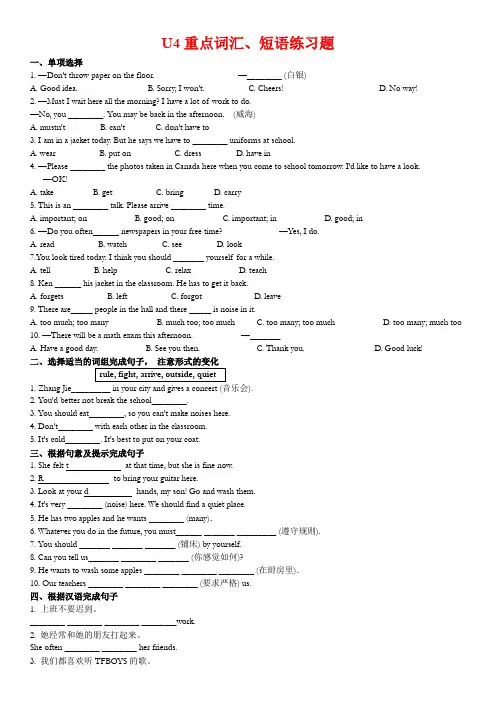
U4重点词汇、短语练习题一、单项选择1. —Don't throw paper on the floor. —________ (白银)A. Good idea.B. Sorry, I won't.C. Cheers!D. No way!2. —Must I wait here all the morning? I have a lot of work to do.—No, you ________. You may be back in the afternoon. (威海)A. mustn'tB. can'tC. don't have to3. I am in a jacket today. But he says we have to ________ uniforms at school.A. wearB. put onC. dressD. have in4. —Please ________ the photos taken in Canada here when you come to school tomorrow. I'd like to have a look.—OK!A. takeB. getC. bringD. carry5. This is an ________ talk. Please arrive ________ time.A. important; onB. good; onC. important; inD. good; in6. —Do you often______ newspapers in your free time? —Yes, I do.A. readB. watchC. seeD. look7.You look tired today. I think you should _______ yourself for a while.A. tellB. helpC. relaxD. teach8. Ken ______ his jacket in the classroom. He has to get it back.A. forgetsB. leftC. forgotD. leave9. There are_____ people in the hall and there _____ is noise in it.A. too much; too manyB. much too; too muchC. too many; too muchD. too many; much too10. —There will be a math exam this afternoon. —_______A. Have a good day.B. See you then.C. Thank you.D. Good luck!二、选择适当的词组完成句子,注意形式的变化1. Zhang Jie_________ in your city and gives a concert (音乐会).2. You'd better not break the school________.3. You should eat________, so you can't make noises here.4. Don't________ with each other in the classroom.5. It's cold________. It's best to put on your coat.三、根据句意及提示完成句子1. She felt t at that time, but she is fine now.2. R to bring your guitar here.3. Look at your d hands, my son! Go and wash them.4. It's very ________ (noise) here. We should find a quiet place.5. He has two apples and he wants ________ (many).6. Whatever you do in the future, you must______ _______ _________ (遵守规则).7. You should _______ _______ _______ (铺床) by yourself.8. Can you tell us_______ ________ _______ (你感觉如何)?9. He wants to wash some apples ________ ________ ________ (在厨房里).10. Our teachers ________ ________ ________ (要求严格) us.四、根据汉语完成句子1. 上班不要迟到。
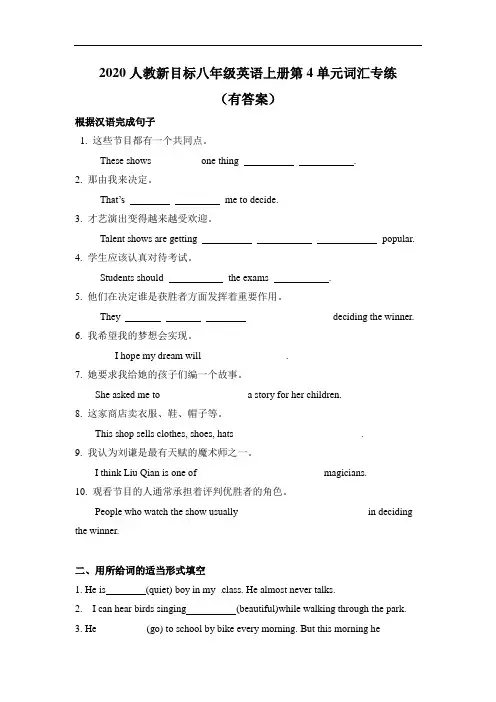
2020人教新目标八年级英语上册第4单元词汇专练(有答案)根据汉语完成句子1. 这些节目都有一个共同点。
These shows _________ one thing .2. 那由我来决定。
That’s me to decide.3. 才艺演出变得越来越受欢迎。
Talent shows are getting popular.4. 学生应该认真对待考试。
Students should the exams .5. 他们在决定谁是获胜者方面发挥着重要作用。
They _______ _______ deciding the winner.6. 我希望我的梦想会实现。
I hope my dream will ________ ________.7. 她要求我给她的孩子们编一个故事。
She asked me to ________ ________ a story for her children.8. 这家商店卖衣服、鞋、帽子等。
This shop sells clothes, shoes, hats ________ ________ ________.9. 我认为刘谦是最有天赋的魔术师之一。
I think Liu Qian is one of________ ________ ________ magicians.10. 观看节目的人通常承担着评判优胜者的角色。
People who watch the show usually ________ ________ ________ in deciding the winner.二、用所给词的适当形式填空1. He is (quiet) boy in my class. He almost never talks.2. I can hear birds singing(beautiful)while walking through the park.3. He _________ (go) to school by bike every morning. But this morning he_________ (go) by bus.4. Doing morning exercises ____________ (be) good for you.5. Thanks a lot for ____________(invite) us __________(go) to your party.6. John plays football as____________(good)as his brother jack.7. Please tell him _____________(wash) his hands before supper.8 .Linda is ____________(tall) one of the two girls.9. The radio station Oldies 102.1FM is pretty bad. It’s(bad) than All Talk 970AM.10. Tina is____________(short) than Jill.11. Let’s go to Danny’s. The food there is(cheap) than any other place in town.12. My dog is (friendly) than yours.13. The (love) girl is planning to go shopping.14. Linda is the(win)of the English speech contest.15. Lots of(perform)from different places around China took part in the talent show.16. Let’s go to Danny’s. The food there is (cheap)in town.17. The radio station Oldies 102.1FM is pretty bad. It’s(bad)than All Talk 970AM.18. He is (quiet)boy in my class. He almost never talks.19. My dog is (friendly)than yours.20. I think Zhou Xingchi is (famous)movie star in the world.21.Yao Ming is (popular)basketball player in China.22. This book is (expensive)than that one.23. Who do you think is (boring), Tim or Tom?24. He is (good)football player of the three.25. I like the movie theater Movie Palace best because I can sit(comfortable).四、根据首字母提示完成句子1. This movie theater has the most c seats.2. Hotel usually cut their p in winter. About 200 yuan a night is enough.3. He was the quietest performer. He danced w music.4. ---Welcome to our n . ---Thank you.5. My sister Isabel is the most b person I know.6. Last week’s talent show was a great s.7. ---What do you think of Funky Fashions?---I think it’s the w.The clothes there are too expensive.8. Of all the clothes stores, you can buy clothes the most c in Jason’s.9. I like this supermarket best because I can buy the f food here.10. Town Cinema has the biggest screens and the best s .答案一、根据汉语完成句子。
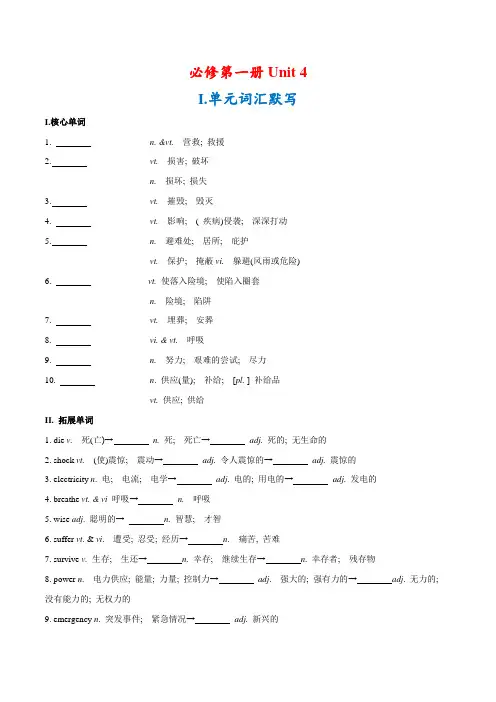
必修第一册Unit 4I.单元词汇默写I.核心单词1. n. &vt. 营救; 救援2.vt. 损害; 破坏n. 损坏; 损失3.vt. 摧毁; 毁灭4. vt. 影响; ( 疾病)侵袭; 深深打动5.n. 避难处; 居所; 庇护vt. 保护; 掩蔽vi. 躲避(风雨或危险)6. vt. 使落入险境; 使陷入圈套n. 险境; 陷阱7. vt. 埋葬; 安葬8. vi. &vt. 呼吸9. n. 努力; 艰难的尝试; 尽力10. n. 供应(量); 补给; [pl. ] 补给品vt. 供应; 供给II. 拓展单词1. die v. 死(亡)→n. 死; 死亡→adj. 死的; 无生命的2. shock vt. (使)震惊; 震动→adj. 令人震惊的→adj. 震惊的3. electricity n. 电; 电流; 电学→adj. 电的; 用电的→adj. 发电的4. breathe vt. &vi呼吸→n. 呼吸5. wise adj. 聪明的→ n. 智慧; 才智6. suffer vt. & vi. 遭受; 忍受; 经历→n. 痛苦, 苦难7. survive v. 生存; 生还→n. 幸存; 继续生存→n. 幸存者; 残存物8. power n. 电力供应; 能量; 力量; 控制力→adj. 强大的; 强有力的→adj. 无力的; 没有能力的; 无权力的9. emergency n. 突发事件; 紧急情况→adj. 新兴的10. length n. 长; 长度→adj. 长的III..核心短语1. 严重受损; 破败不堪2.震惊; 吃惊3. 数以万计的4. 谈起; 说起; 提到; 指的是5. 至少; 起码; 无论如何6. 露天; 在户外7.结束8. 站在……(达特定水平)9. 消灭; 彻底消除10.现有(尤指帮助)IV..经典句式1. 句型公式: too+adj. +to. . . 太……而不能……In the farmyards, the chickens and even the pigs were (太紧张了而不吃东西).2. 句型公式: It seems/ seemed as if. . . 看起来似乎……(看起来似乎) the world was at an end!3. 句型公式: whose引导的定语从句Workers built shelters for survivors(他们的家园) had been destroyed.【参考答案】I.核心单词1. rescue n. &vt. 营救; 救援2. damage vt. 损害; 破坏n. 损坏; 损失3. destroy vt. 摧毁; 毁灭4. affect vt. 影响; ( 疾病)侵袭; 深深打动5. shelter n. 避难处; 居所; 庇护vt. 保护; 掩蔽vi. 躲避(风雨或危险)6. trap (trapped, trapped)vt. 使落入险境; 使陷入圈套n. 险境; 陷阱7. bury vt. 埋葬; 安葬8. breathe vi. &vt. 呼吸9. effort n. 努力; 艰难的尝试; 尽力10. supply n. 供应(量); 补给; [pl. ] 补给品vt. 供应; 供给II. 拓展单词1. die v. 死(亡)→death n. 死; 死亡→dead adj. 死的; 无生命的2. shock vt. (使)震惊; 震动→shocking adj. 令人震惊的→shocked adj. 震惊的3. electricity n. 电; 电流; 电学→electric adj. 电的; 用电的→electrical adj. 发电的4. breathe vt. &vi呼吸→breath n. 呼吸5. wise adj. 聪明的→wisdom n. 智慧; 才智6. suffer vt. & vi. 遭受; 忍受; 经历→suffering n. 痛苦, 苦难7. survive v. 生存; 生还→survival n. 幸存; 继续生存→survivor n. 幸存者; 残存物8. power n. 电力供应; 能量; 力量; 控制力→powerful adj. 强大的; 强有力的→powerless adj. 无力的; 没有能力的; 无权力的9. emergency n. 突发事件; 紧急情况→emergent adj. 新兴的10. length n. 长; 长度→long adj. 长的III..核心短语1. in ruins严重受损; 破败不堪2. in shock震惊; 吃惊3. tens of thousands of数以万计的4. refer to谈起; 说起; 提到; 指的是5. at least至少; 起码; 无论如何6. in the open air露天; 在户外7. e to an end结束8. stand at sth. 站在……(达特定水平)9. sweep away消灭; 彻底消除10. on hand现有(尤指帮助)IV.经典句式1. 句型公式: too+adj. +to. . . 太……而不能……In the farmyards, the chickens and even the pigs were too nervous to eat(太紧张了而不吃东西).2. 句型公式: It seems/ seemed as if. . . 看起来似乎……It seemed as if(看起来似乎) the world was at an end!3. 句型公式: whose引导的定语从句Workers built shelters for survivors whose homes(他们的家园) had been destroyed.II.单元词汇综合练习单词拼写1. A woman rescued after being (埋) for about 132 hours due to the building collapse was found alive.2. Without (电), human life would be quite different today.3. The red (砖) building over there is a hospital.4. America’s sharp rise in tariff has had a great (影响) on imports from China.5. A welltrained sniffer dog helped the soldier find a lady (困于险境) under the ruins.6. The children were so lucky to have (幸存) the earthquake.7. He survived the (洪水) by holding on to a piece of wood.8. The electricity(供应) had been cut off.9. He (扫去) the leaves into a pile and left for school.10. The president will a powerful speech (发表演说) about learning strategies.11. He behaved calmly when dealing with the(突发事件).12. People were running for the from the storm.(避风雨处)13. If you make a(n)(努力)to study now, you will enjoy a colorful and fruitful life in the future.14. The (救援) attempt was frustrated by bad weather.15. If you decide to (发表) a speech, please make it brief.16. She was feeding the baby who (幸存)the earthquake.17. I’ll order a special messenger to(递送) the document.18. She took a deep breath and sat up slowly with great (努力).19. She stood on the deck and (挥手) her hand at them as the steamer moved off.20. I wondered if it was an animal caught in a (陷阱).21. In the rescue work, (直升机) were used where the rescuers could not reach directly.22. Timmy had nothing to eat when he was (使落入险境)under the stones.23. People who ran from the war were living in a homeless (遮蔽处).24. Imported products were in short (供给), creating serious social unrest throughout the country.25. The car (遭受) serious damage in the accident.26. He congratulated himself on having (幸存) the aircrash.27. Plants produce air for humans to (呼吸) and food to eat.28. She would (挥手)goodbye to him, and he would stand and watch the bus until it vanished around a turn.29. In 2005, none of students (营救) from that big earthquake finally because of the bad weather and limited time and energy.30. Ten students will (发表) their speeches on the given topic “Man and the Nature”.31. There is no need to worry. We can (提供) you with whatever you need.32. The donations will be (提供) to people in the floodhit area immediately.33. Within a few days Mary had bee seriously ill, (遭受) great pain.34. Workers built shelters for whose homes had been destroyed. (幸存者)35. He ran the entire (长度) of the beach on such a cold day.36. I didn't sleep well last night, and woke up with a (轻微的)headache.37. If a typhoon is approaching, everything has to be strapped down to stop it from (滑动) around.38. A storm cut off the to the whole area (电能).39. When I was confused about my life, I was impressed with the of Tom’s words. (智慧)40. The group produces a monthly (总结) of their research.41. Spencer’s parents were very proud of their son for his good work in the face of an (突发事件).42. It is an area where natural (灾难) often happen.43. I can certainly feel the (影响) of too many late nights.44. As we all know,the flood really did great (损害) to the crops there.45. I question the (明智) of giving a child so much money.46. With strong support from the government and the tireless (努力) of th e city’s people, a new Tangshan was built upon the earthquake rums.(根据汉语提示单词拼写)47. It was very considerate of you to (递送) milk to my door every morning.48. More than seven million people have been affected by (干旱).49. His father (遭受) a serious allergic reaction, which stopped his heart.50. They've switched off the (电源)51. It was the last day of the year and a large crowd of people had gathered under the Town Hall clock. It would twelve in twenty minutes’ time. (From Lesson 9)52. Although he knew Mary had cancer,the news of her death came as a .53. Huge projects designed to poorer countries can sometimes do more harm than good.54. She terribly in the winter when it's cold and her joints get stiff.55. Shortly, the city began to again.56. Shortly after from a massive earthquake and being reduced to ruins, the city took on a new look.57. The UN has agreed to allow the of emergency aid.58. If there is a , a large amount of water covers an area which is usually dry, for example when a river flows over its banks or a pipe bursts.59. A is a very bad accident such as an earthquake or a plane crash, especially one in which a lot of people are killed.60. With knowledge and , evil could be vanquished on this earth.61. is a hard substance such as iron, steel, gold, or lead.62. Soon after the quakes, the army sent 150,000 soldiers to Tangshan to dig out those who were and to bury the dead.63. A is a long period of time during which no rain falls.64. is a person’s emotional and physical condition when something very frightening or upsetting has happened to them.65. He head injuries in a road accident.66. Workers built for survivors whose homes had been destroyed.67. Not very long ago, the only way to stay in touch with faraway friends was writing letters that took ages tobe .68. A is a very narrow gap between two things, or between two parts of a thing.69. You use to talk about amounts. For example, if an amount is 10% of a larger amount, it is equal to 10 hundredths of the larger amount.70. A is a group of items that are kept together, often in the same container, because they are all used for similar purposes.71. He’d had to his pain over the years.72. There’s been a bomb threat. , we need to evacuate.73. Tangshan city has proved that people must unify and show the to stay positive and rebuild for brighter future.74. Suddenly, a look of confusion over her face.75. I fell, my head against the door.76. Soon after the quakes, the army sent 150,000 soldiers to Tangshan to dig out those who were and to the dead.77. In many habitats of the monarch butterflies, people are the natural environment, such as cutting down trees and using chemicals.78. is the store of knowledge that a society or culture has collected over a long period of time.79. is a form of energy that can be carried by wires and is used for heating and lighting, and to provide power for machines.80. Though Lin Qiaozhi n ever married, she was known as the “mother of ten thousand babies”, havingover 50,000 babies in her lifetime.81. Workers built shelters for survivors, whose home has been destroyed. Hundreds of thousands of people were helped. Water and food were brought into the city by train, truck and plane. Slowly, the city began toagain.82. He was improving for a while, but I think he has back into his old habits.83. is the state of being severely damaged or spoiled, or the process of reaching this state.84. Conflict among the four adults and two boys could at any time, but Shan said that while they argued about issues they never fought.85. The war has caused terrible to the local people.86. Her attempts to them down only made matters worse.87. The rescue team were in the burning building.88. are rectangular blocks of baked clay used for building walls, which are usually red or brown.89. If you make an to do something, you try very hard to do it.90. The pilot of the aircraft was forced to make an landing on Lake Geneva.91. He is from tension and doesn’t know how to deal with it.92. Nearly 70,000 people from 146 villages in that county were affected by .93. is energy, especially electricity, that is obtained in large quantities from a fuel source and used to operate lights, heating, and machinery.94. A is a small building or covered place which is made to protect people from bad weather or danger.参考答案1. buried【解析】考查动词。
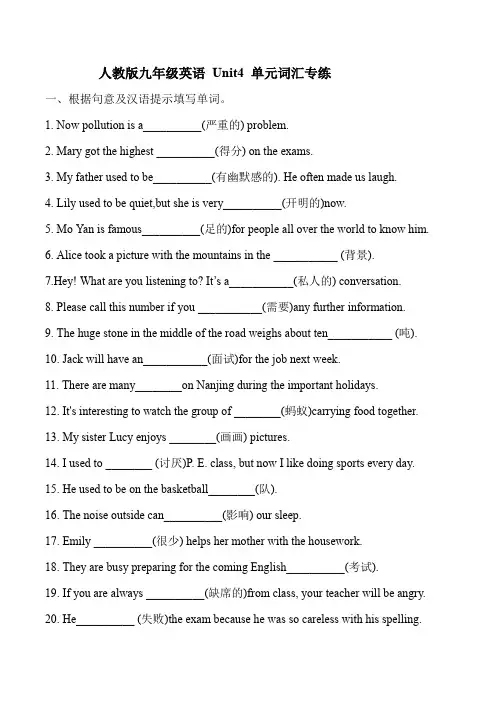
人教版九年级英语Unit4 单元词汇专练一、根据句意及汉语提示填写单词。
1.Now pollution is a__________(严重的)problem.2.Mary got the highest__________(得分)on the exams.3.My father used to be__________(有幽默感的).He often made us laugh.4.Lily used to be quiet,but she is very__________(开明的)now.5.Mo Yan is famous__________(足的)for people all over the world to know him.6.Alice took a picture with the mountains in the___________(背景).7.Hey!What are you listening to?It’s a___________(私人的)conversation.8.Please call this number if you___________(需要)any further information.9.The huge stone in the middle of the road weighs about ten___________(吨).10.Jack will have an___________(面试)for the job next week.11.There are many________on Nanjing during the important holidays.12.It's interesting to watch the group of________(蚂蚁)carrying food together.13.My sister Lucy enjoys________(画画)pictures.14.I used to________(讨厌)P.E.class,but now I like doing sports every day.15.He used to be on the basketball________(队).16.The noise outside can__________(影响)our sleep.17.Emily__________(很少)helps her mother with the housework.18.They are busy preparing for the coming English__________(考试).19.If you are always__________(缺席的)from class,your teacher will be angry.20.He__________(失败)the exam because he was so careless with his spelling.二、用括号中所给词的适当形式填空。
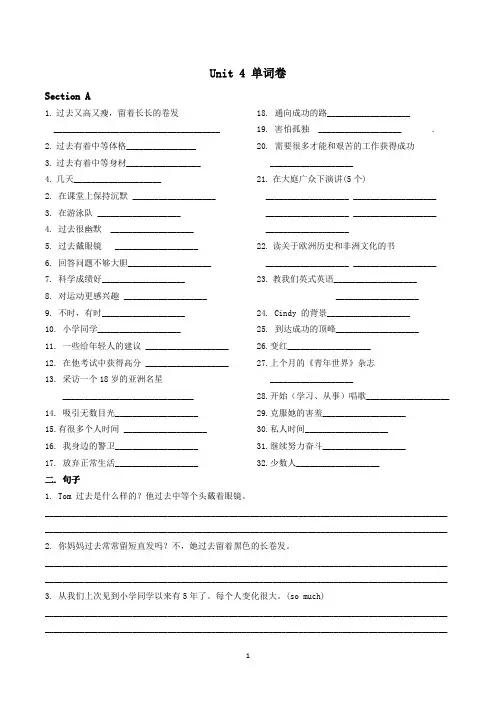
Unit 4 单词卷Section A1.过去又高又瘦,留着长长的卷发______________________________________2.过去有着中等体格________________3.过去有着中等身材_________________4.几天____________________2. 在课堂上保持沉默 ___________________3. 在游泳队 ___________________4. 过去很幽默 ___________________5. 过去戴眼镜 ___________________6. 回答问题不够大胆___________________7. 科学成绩好___________________8. 对运动更感兴趣 ___________________9. 不时,有时___________________10. 小学同学___________________11. 一些给年轻人的建议 ___________________12. 在他考试中获得高分 ___________________13. 采访一个18岁的亚洲名星______________________________14. 吸引无数目光___________________15.有很多个人时间 ___________________16. 我身边的警卫___________________17. 放弃正常生活___________________ 18. 通向成功的路___________________19. 害怕孤独 ___________________ .20. 需要很多才能和艰苦的工作获得成功___________________21.在大庭广众下演讲(5个)___________________ ___________________ ___________________ ___________________ ___________________22.读关于欧洲历史和非洲文化的书___________________ ___________________ 23.教我们英式英语______________________________________24. Cindy 的背景___________________25. 到达成功的顶峰___________________26.变红___________________27.上个月的《青年世界》杂志___________________28.开始(学习、从事)唱歌___________________29.克服她的害羞___________________30.私人时间___________________31.继续努力奋斗___________________32.少数人___________________二. 句子1. Tom 过去是什么样的?他过去中等个头戴着眼镜。
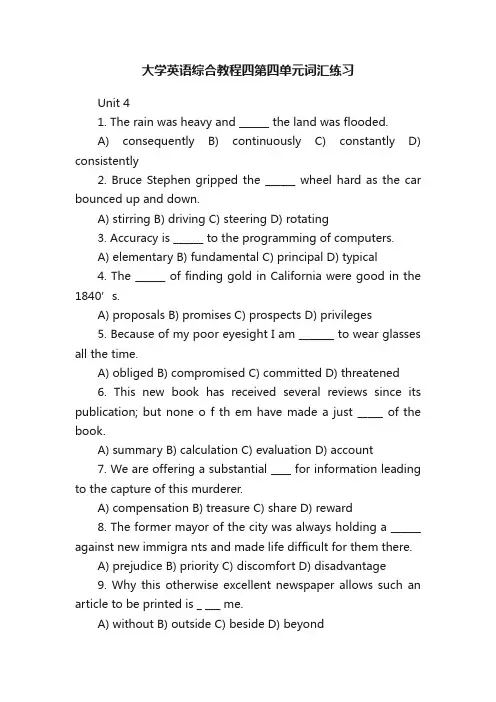
大学英语综合教程四第四单元词汇练习Unit 41. The rain was heavy and ______ the land was flooded.A) consequently B) continuously C) constantly D) consistently2. Bruce Stephen gripped the ______ wheel hard as the car bounced up and down.A) stirring B) driving C) steering D) rotating3. Accuracy is ______ to the programming of computers.A) elementary B) fundamental C) principal D) typical4. The ______ of finding gold in California were good in the 1840’s.A) proposals B) promises C) prospects D) privileges5. Because of my poor eyesight I am _______ to wear glasses all the time.A) obliged B) compromised C) committed D) threatened6. This new book has received several reviews since its publication; but none o f th em have made a just _____ of the book.A) summary B) calculation C) evaluation D) account7. We are offering a substantial ____ for information leading to the capture of this murderer.A) compensation B) treasure C) share D) reward8. The former mayor of the city was always holding a ______ against new immigra nts and made life difficult for them there.A) prejudice B) priority C) discomfort D) disadvantage9. Why this otherwise excellent newspaper allows such an article to be printed is _ ___ me.A) without B) outside C) beside D) beyond10. I can’t drive this car, as I’m not ____ with its controls.A) accustomed B) aware C) familiar D) informed11. As he had worked in the army as an electrical engineer for many years, he had every _____ for the job.A) privilege B) obligation C) qualification D) commitment12. Out of ______ revenge, he did his worst to blacken her character and ruin her reputation.A) perfect B) total C) sheer D) thorough13. We are preparing a dinner for twenty people, but this table is not ____wide for our purpose.A) sufficiently B) considerably C) enough D) indeed14. The rest of the family had nearly reached the river, but Jane was ____ behind as usual.A) declining B) delaying C) lacking D) lagging15. When I saw Jane, I stopped and smiled, but she ____ me and walked on.A) refused B) ignored C) declined D) neglected16. People in New York City ____ that their city is the most vital city in the world.A) announce B) claim C) describe D) pronounce17. Some plants are so sensitive ______ pollution that they can only survive in perf ectly clean environment.A) from B) against C) to D) with18. Reporters asked the Congressman to _____ his position on welfare reform.A) evolve B) clarify C) imply D) quote19. This terrorist attack has been _____ by the entire international community.A) condemned B) scolded C) criticized D) blamed20. I was busy ______ plans for the new course.A) setting up B) getting up C) laying down D) drawing up21. The cost of the war has _____ national development by ten years.A) pulled off B) set back C) backed down D) called off22. His nationality isn’t ______ to whether he’s a good lawyer.A) attacked B) relevant C) associated D) regarding23. Surprisingly, the sixty-year-old man has acquired ________ in a foreign language through practice.A. deficiencyB. sufficiencyC. proficiencyD. efficiency24. If you _____ bright sunlight _____ dry wood with a glass, it will start burning.A) expose… to B) concentrate…on C) aim …at D) focus …on25. A well-written composition ____ good choice of words and clear organization a mong other things.A) calls on B) calls for C) calls up D) calls offKeys:1-5 ACBCA 6-10 CDADC 11-15 CCADB16-20 BCBAD 21-25 BBCDB1.It is well-known that photographic paper is highly sensitive _______ light.A. fromB. againstC. toD. with1.The price of beer ____ from 50 cents to $4 per liter during the summer season.A. alteredB. rangedC. separatedD. differed1.The personnel manager said that he couldn't ______ Mike's ability without actually seeing him at work.A. summarizeB. calculateC. evaluateD. account1.The boss managed to ______ the discussion away from the subject of money and into the topic of environmental protection.A. attachB. steerC. associateD. stir1.This decree ____________the Union to delay strikes.A. obligedB. compromisedC. committedD. threatened1.The government has several plans ___ to solve the problem.A. in a wayB. by the wayC. under wayD. in the way1.The world’s governments have done ____nothing to combat the threat of nuclear accidents.A. specificallyB. vitallyC. virtuallyD. identically1.We as a company feel that it is ___ to maintain good worker-management relations.A. moderateB. specialC. absoluteD. essential9. After so many years in the military service, I’m glad to get back to ____ clothe s.A. civilB. civilizedC. civilianD. citizen10. President Banda’s background as a doctor has given him ________ into the me dical problem that face the country.A. a viewB. a visionC. an insightD. a sight11. A sweet smile is a figurative expression(比喻用法), but sweet coffee is a ____ _ one.A. literalB. literaryC. literateD. illiterate12. While there are some problems with grammar or usage, they are not serious e nough to ______ meaning.A. retortB. distortC. resortD. deny13. At the same time we have to _____ longer-term plans to guide us towards su stained economic growth in the future.A. set outB. put up withC. build upD. draw up1.Perhaps the price of the wine will be much higher next year because the _______ for this year’s wine harvest are poor.A. prospectsB. promisesC. proposalsD. privileges1.This PLA soldier _______ personal danger when he jumped into the icy water to save the drowning child.A. refusedB. declinedC. ignoredD. neglected1.At present, one of this city’s most serious problems is housing that _________ immediate solution .A. calls onB. calls forC. calls upD. calls off1.Once ____ of his daughter’s safety, he was casual and re laxed.A. insuredB. assuredC. ensuredD. secured18. One can _____ even from one’s unpleasant experiences.A) obtain B) earn C) develop D) benefit19.He carefully joined the cables and ensured the connections were ____.A. dynamicB. rigidC. solidD. positive1.The experience that he returned to college for the courses that he failed when he was young _______ him _____much valuable time and money.A. pulled offB. set backC. backed downD. called off1.Many animals can ____ with their surroundings, owing totheir protective coloring.A. uniteB. identifyC. connectD. blend1.He had good reason to be grateful for the opportunities which they had made available to him and which ______ led to the good position he now held.A. consequentlyB. continuouslyC. constantlyD. consistently1.The Chinese _________ Test (HSK) is a series test to assess the Chinese language proficiency of non-native speakers.A. CapabilityB. SufficiencyC. ProficiencyD. Capacity1.The steel output of these countries fell by a wide ______ in July.A. borderB. edgeC. marginD. brim1.The food in this restaurant is good and the same ______ the service.A. is true ofB. is true inC. be true forD. be true at题号答案题号答案题号答案题号答案1 C 8 D 15 C 22 A2 B 9 C 16 B 23 C3 C 10 C 17 B 24 C4 B 11 A 18 D 25 A5 A 12 B 19 C6 C 13 D 20 B7 C 14 A 21 D。
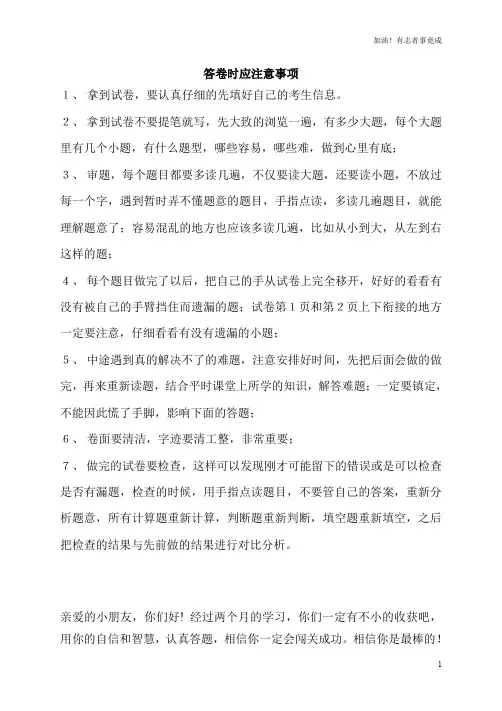
加油!有志者事竟成答卷时应注意事项1、拿到试卷,要认真仔细的先填好自己的考生信息。
2、拿到试卷不要提笔就写,先大致的浏览一遍,有多少大题,每个大题里有几个小题,有什么题型,哪些容易,哪些难,做到心里有底;3、审题,每个题目都要多读几遍,不仅要读大题,还要读小题,不放过每一个字,遇到暂时弄不懂题意的题目,手指点读,多读几遍题目,就能理解题意了;容易混乱的地方也应该多读几遍,比如从小到大,从左到右这样的题;4、每个题目做完了以后,把自己的手从试卷上完全移开,好好的看看有没有被自己的手臂挡住而遗漏的题;试卷第1页和第2页上下衔接的地方一定要注意,仔细看看有没有遗漏的小题;5、中途遇到真的解决不了的难题,注意安排好时间,先把后面会做的做完,再来重新读题,结合平时课堂上所学的知识,解答难题;一定要镇定,不能因此慌了手脚,影响下面的答题;6、卷面要清洁,字迹要清工整,非常重要;7、做完的试卷要检查,这样可以发现刚才可能留下的错误或是可以检查是否有漏题,检查的时候,用手指点读题目,不要管自己的答案,重新分析题意,所有计算题重新计算,判断题重新判断,填空题重新填空,之后把检查的结果与先前做的结果进行对比分析。
亲爱的小朋友,你们好! 经过两个月的学习,你们一定有不小的收获吧,用你的自信和智慧,认真答题,相信你一定会闯关成功。
相信你是最棒的!1Unit 4 Then and now单元重点测试.总分:100分答题时间:60 分钟得分:_______________词汇测试;一、将下列字母重新排序组成单词,并写出汉语意思。
(10分)( )1. rssga__________ ( )2.ymg__________ ( )3. intobadmn__________ ( ) 4. lciycng__________ ( )5. akste__________二、按要求写-写。
(10分)1. slow(对应词)____________2. wake(过去式)____________3. old(比较级)____________4. active(对应词)____________5. where(同音异义词)____________三、看图,选出正确的短语。
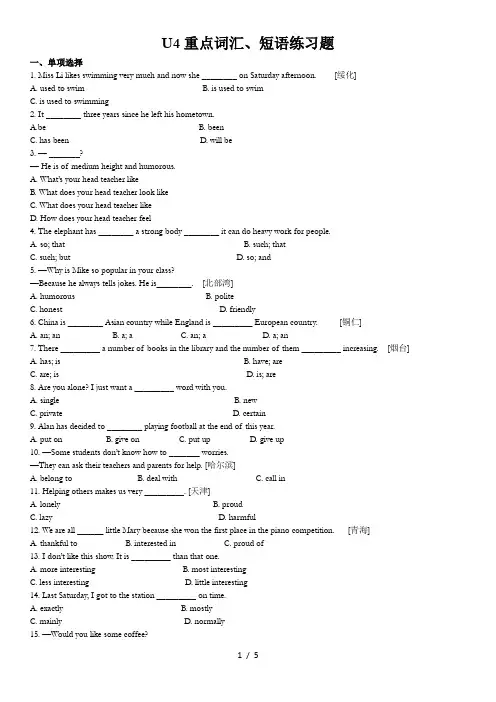
U4重点词汇、短语练习题一、单项选择1. Miss Li likes swimming very much and now she ________ on Saturday afternoon. [绥化]A. used to swimB. is used to swimC. is used to swimming2. It ________ three years since he left his hometown.A.beB. beenC. has beenD. will be3. — _______?— He is of medium height and humorous.A. What’s your head teacher likeB. What does your head teacher look likeC. What does your head teacher likeD. How does your head teacher feel4. The elephant has ________ a strong body ________ it can do heavy work for people.A. so; thatB. such; thatC. such; butD. so; and5. —Why is Mike so popular in your class?—Because he always tells jokes. He is________. [北部湾]A. humorousB. politeC. honestD. friendly6. China is ________ Asian country while England is _________ European country. [铜仁]A. an; anB. a; aC. an; aD. a; an7. There _________ a number of books in the library and the number of them _________ increasing. [烟台]A. has; isB. have; areC. are; isD. is; are8. Are you alone? I just want a _________ word with you.A. singleB. newC. privateD. certain9. Alan has decided to ________ playing football at the end of this year.A. put onB. give onC. put upD. give up10. —Some students don’t know how to _______ wo rries.—They can ask their teachers and parents for help. [哈尔滨]A. belong toB. deal withC. call in11. Helping others makes us very _________. [天津]A. lonelyB. proudC. lazyD. harmful12. We are all ______ little Mary because she won the first place in the piano competition. [青海]A. thankful toB. interested inC. proud of13. I don’t like this show. It is _________ than that one.A. more interestingB. most interestingC. less interestingD. little interesting14. Last Saturday, I got to the station _________ on time.A. exactlyB. mostlyC. mainlyD. normally15. —Would you like some coffee?—No, thanks. I _____ drink coffee. [徐州]A. seldomB. oftenC. onlyD. always二、根据句意或括号内所给词的适当形式填空1. She is ________(friend) to everyone. We all like her.2. Tom is a ________(help) boy. He is ready to help others when they are in trouble.3. He is used to ________(have) a cup of tea first after getting up. [常州]4. We can see some fishes ____________(swim)in the river now.5. They ____________(know) each other since they were children.6. Is Russia a __________ (Europe) country?7. How do you dare _________ (say) that to your teacher?8. His hard work brought him great ___________ (succeed) in the end.9. Peng Liyuan gave two wonderful __________ (speak) in English at the United Nations on September 26th,2015.10. You should try to overcome your __________ (shy).11. I don’t like travelling, so I s go anywhere else.12. Tony was sad because he f his math test.13. His father’s words had i on him.14. You can talk about it with Jim in p .15. We all take p in your success.三、根据汉语意思完成句子1. 我打算学习摄影。
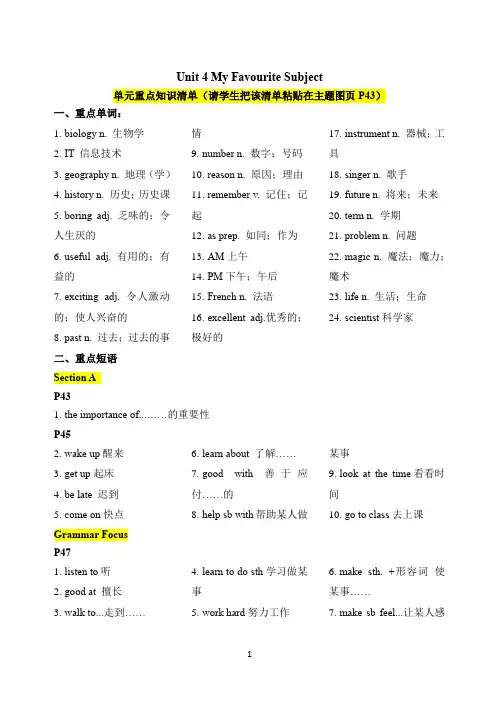
Unit 4 My Favourite Subject单元重点知识清单(请学生把该清单粘贴在主题图页P43)一、重点单词:1.biology n. 生物学2.IT 信息技术3.geography n. 地理(学)4.history n. 历史;历史课5.boring adj. 乏味的;令人生厌的eful adj. 有用的;有益的7.exciting adj. 令人激动的;使人兴奋的8.past n. 过去;过去的事情9.number n. 数字;号码10.reason n. 原因;理由11.remember v. 记住;记起12.as prep. 如同;作为13.AM上午14.PM下午;午后15.French n. 法语16.excellent adj.优秀的;极好的17.instrument n. 器械;工具18.singer n. 歌手19.future n. 将来;未来20.term n. 学期21.problem n. 问题22.magic n. 魔法;魔力;魔术23.life n. 生活;生命24.scientist科学家二、重点短语Section AP431.the importance of...……的重要性P452.wake up醒来3.get up起床4.be late 迟到e on快点6.learn about 了解……7.good with善于应付……的8.help sb with帮助某人做某事9.look at the time看看时间10.go to class去上课Grammar Focus P471.listen to听2.good at 擅长3.walk to...走到……4.learn to do sth学习做某事5.work hard努力工作6.make sth. +形容词使某事……7.make sb feel...让某人感到……8.the same...as...和……相同的Section BP481.make sb +形容词使某人感到……2.let sb do sth让某人做某事3.all kinds of...各种各样的……4.want to be...想要成为5.in the future将来6.work out计算出;解决7.math problem数学问题8.in class课堂上9.feel like感觉像10.in one’s life在某人的生活中e...to do sth使用……来做某事三.重点句型:1. What’s your favourite subject?你最喜欢的科目是什么?P44 1d2. Why do you like...?你为什么喜欢……?Because it’s ...因为它……P44 1d3. You’re going to be late.你要迟到了。
Unit 4 默写卷一、必背单词及与其关联的词和词组。
1. ________ (v.) 允许;准许→ ________________允许某人做某事2. ________ (adj.) 有毛病;错误的3. ________ (v.) 猜测→ ________我想……4. ________ (n.) 协议;交易5. ________ (n.) 关系;联系;交往→ _______(v.) 关联6. ________ (n.) 交流;沟通→ _____________ (v.)交流7. ________ (v.) 争论;争吵→ __________(n.) 争论8. ________ (n.) 云;云朵→ _______(adj.) 多云的9. ________ (adj.) 年纪较长的→ ______(adj.) 年纪较长的10. ________ (adv.) 代替;反而;却→ __________代替11. ________ (pron.) 任何;每一12. ________ (adj.) 焦虑的;担忧的13. ________ (v.) 主动提出;自愿给予→ ______________主动提出做某事14. ________ (adj.) 正确的;恰当的→ ________(adv.)正确地;恰当地15. ________ (adv.) 其次;第二→ _______(adv.) 首先;第一16. ________ (v.) 交流→ _______________(n.) 交流17. ________ (v.) 解释;说明→ ___________(n.) 解释;说明18. ________ (adj.) 清楚易懂的;晴朗的→ ________ (adv.)清楚易懂地;晴朗地19. ________ (v.) 抄袭;模仿;复印;复制20. ________ (v.) 归还;回来;返回21. ________ (adv.) 再也(不);(不)再22. ________ (n.) 成员;分子23. ________ (n.) 压力→ ______ (v.) 按;压24. ________ (v.) 竞争;对抗→ ___________(n.) 竞争→__________ (n.) 竞争者;对手25. ________ (n.) 意见;想法;看法26. ________ (n.) 技艺;技巧27. ________ (adj.) 典型的28. ________ (n.)( 美式) 橄榄球;足球29. ________ (adj.) 快的;迅速的;时间短暂的→________ (adv.) 快速地;快地30. ________ (v.) 持续;继续存在31. ________ (v.) 比较→_________________把……与……比较32. ________ (adj.) 不理智的;疯狂的→______________ 对……着迷33. ________ (v.) 鞭策;督促;推动→________________督促某人做某事34. ________ (n.) 发展;发育;成长→_________(v.) 发展;成长35. ________ (v.) 造成;引起→_________________导致某人做某事36. ________ (adj.) 通常的;寻常的→反义词:________ 不寻常的37. ________ (adv.) 可能;大概;也许二、必背短语。
Unit 4 My Favourite Subject一、单词拼写1.He likes (生物) best because he likes studying animals.2.The purpose of learning and discussing (历史) is to lead our life today. 3.(数字) are important in our life. You can see them nearly everywhere. 4.For this (原因), my grandpa plays cards for fun.5.The scientist showed us how (记住) new words in a quick way.6.Xu Fei likes the A singer Dan Dervish(澳大利亚歌手).7.Have you got any plans about your (将来)?8.We have some activities this (学期).9.He seems to have because he can always make impossible things happen.(魔法)10.Dave’s father and uncle are both (科学家).二、语音题找出下列单词中划线部分发音不同的单词。
11.A.pear B.fear C.tear D.hear12.A.tour B.poor C.pure D.sure13.A.fair B.there C.clearly D.stare14.A.skill B.field C.build D.filter15.A.area B.teach C.dream D.breathe三、单项选择16.Dale has a brother, ________ he also has a sister.A.so B.and C.or17.下面句子四个选项中,哪个不可以连读?First of all, he took out the potato and cut it up.a b c dA.a B.b C.c D.d18.We are ________ when we hear the ________ news—we don’t have classes tomorrow.A.exciting; excited B.excited; exciting C.excited; excited D.exciting; exciting 19.I can’t go to the park with you ________ I am too busy these days.A.so B.because C.but D.or20.Which underlined(划线的)part makes a different sound?A.brown B.house C.bowl D.mouth21.The notebook is very _______. It can help me with my English.A.relaxing B.fun C.boring D.useful22.Which of the following underlined part matches the sound /aʊ/?A.road B.awful C.house23.I want to have a trip ________ I’m too busy.A.and B.or C.but D.so24.选出画线部分读音与其他两个不同的选项。
Unit 4词汇篇__________________________________________________________________________________ __________________________________________________________________________________熟练掌握本单元重点词组句型。
一.短语归纳used to do 过去常常be used to doing …习惯于作be used to do 被用来作pay ( more )attention to sth. ( doing sth.) 对…(更加)注意give up doing = stop doing 放弃做…instead of ( doing ) …代替, 而不是lose interest in 对…失去兴趣be afraid ( terrified ) of doing sth. 惧怕做be terrified of sth. / sb.=be afraid of 惧怕某人/ 物…go to sleep = fall asleep 入睡all the time = always 一直,总是with the lights on 开着灯….with the door open ( closed ) 开(关)着门take the bus to school = go to school by bus 坐公车去上学spend time doing = take time to do 花时间做…go right home 直接回家daily life 日常生活chat with sb. about sth 和…聊关于…in the last ( past ) few years 在过去的几年里(用于现在完成时)make you stressed out 使你紧张all day (long) = the whole day 整天as +原级+ as sb. can / could =as+原级+ as possible 尽可能…地in the end = at last = finally 最后,终于to one’s surprise 令某人吃惊的是in surprise 吃惊地even though = even if 尽管no longer = not… any longer 不再no more=not… any more 不再take pride in = be proud of 对…感到自豪the pride of 是…的骄傲change one’s life 改变某人的生活change one’s mind 改变某人的主意an eight-year-old boy 一个八岁大的男孩子after his father's death a few years ago 在几年前他爸死后can /can't afford to buy …能/不能买得起…get into trouble 遇到麻烦be in trouble 处于困境中waste time (money )浪费时间It is necessary to do…做…是必要的1.Peter used to _____ shy and have short hair, but now he is outgoing and _______ long hair.A. be; hasB. be; haveC. is; hasD. is; have2. Most of the girls are _____ of the dark, but Lucy is ______ in them. A. terrifi ed; interested B. interested; terrified C. terrifying; interesting D. interesting; terrif ying3.. ----Would you like to play computer games with me? ----Sorry, I have ______ playi ng them.A. made upB. given upC. looked upD. picked up4. Five minutes later, the teacher went on _________ about the story.A. talkB. to talkC. talkingD. talked5. Li Ming, you should _____ more attention to your pronunciation. A. give B. send C . pay D. Take解析:本题考查used to结构的肯定句及一般现在时。
八年级英语下册Unit4单词测试题八年级英语下册Unit 4单词测试题导语:为了帮大家巩固单词,下面是YJBYS收集的八年级下册Unit 4 单词检测,有需要的同学们可以做一下。
1、允许;准许v2、抄袭;模仿v3、有毛病;错误的adj4、归还;回来v5、协议;交易n6、快的;迅速的adj7、猜测;估计v8、不理智的.;疯狂的adj9、典型的adj10、鞭策;推动v11、关系;联系n12、造成;引起v13、交流;沟通v14、发展,发育;成长n15、,交流;沟通n16、压力n17、云;云朵n18、成员;分子n19、争吵;争论v20. 技巧;技艺n21、主动提出;自愿给予v22、持续;继续存在v23、第二;其次adv.24、(美式)橄榄球;足球n25、解释;说明v26、通常的;寻常的adj27、年纪较长的adj28、可能;大概adv29、焦虑的;担忧的adj30、快速查看;浏览(词组)31、再也;不再adv32、比较;对比33、任何;每一pron.34、和睦相处;关系良好35、代替;反而adv36、成功地发展;解决37、清楚易懂的;晴朗的adj38、删除;删去39、竞争;对抗v.40、依。
看41、你看上去很累,怎么了?42、我昨天晚上学到半夜,所以没有睡够。
43、他应该怎么办?44、他该跟朋友谈谈,这样他就可以对他说对不起。
45、我想我会去,但是我不想让他感到吃惊。
Dear Mr Hunt,My problem is that I can’t_____ _____ _____(与......相处好) my family.Relations between my parents have become _____(困难的). They fight a lot,and I really don’t like it.It’s the only communication they have,I don’t know if I should say anything to them about this.When they____(争吵),it’s like a big,bl ack cloud hanging over our home.Also,my ____ _____(哥哥) is not very nice to me.He always______ _____(拒绝) let me watch my favorite TV show.______(反而) he watches _____ ____ ____(他想要的任何) until late at night.I don’t think this is fair.At home I always ____ _____(感到孤独)and_____(焦虑的).Is that normal?What can I do?Dear Sad and Thirteen,It’s not easy being your age,and it’s normal to have these feelings.Why don’t you talk about these feelings to your family?If your parents have problems,you should _____ ____ _(主动提供)help.Maybe you could do more jobs around the house ____ ____(以便于)they have more time for______ ______(适当的交流).______(其次),why don’t you sit down and _____ _____ (跟......交流)your brother?You should _____(解释) that you don’t mind him watching TV ____ ____ ____(一直,总是).However,he should let you watch your favorite show.I hope things will be better for you soon.Robert HuntMaybe You Should Learn to Relax!These days, Chinese children are sometimes_____(更繁忙)on weekends than weekdays because they have to take___ ____(那么多) after-school classes. Many of them are learning exam skills so that they can ____ _____ (进入)a good high school and later a good university. Others are practicing sports so that they can______(竞赛) and win. However, this doesn't only happen in China.____ _____(Taylor一家) are a _____(典型的)American family. Life for Cathy Taylor's three children is very busy. “On most days after school,” Cathy says, “I ____ one of my two boys____(带......去)basketball practice and my daughter to _____ _____(足球训练). Then I have to take my other son to piano lessons. Maybe I could ___ ____(删去)a few of their activities, but I believe these activities are important for my_____ _____(孩子们的未来). I really want them to be successful.” However, the tired children____ get home_____(直到......才)after 7:00 p.m. They have a quick dinner, and then ____ ____ ____ ____(该做作业的时候了)Linda Miller, amother of three, knows all about such stress. “In some families,competition starts very young and ______(继续)until the kids get older,” she says. “Mothers____ their small kids____(送.......去) all kinds of classes. And they are always _____ them _____(与.......比较)other children. It’s crazy. I don’t think that’s fair. Why don’t they just let their kids be kids? People shouldn’t push their kids so hard.【八年级英语下册Unit 4单词测试题】。
英语人教版9年级上Unit 4词汇与句子一、单项选择1.—Do you mind my smoking here?—________. You can smoke outside.A.Not at all B.Yes, please C.Yes, of course not D.Better not2.--- Excuse me, could I take the seat here?--- _______.The child sitting here will come soon.A.You’d better not B.No, thanksC.Yes, please.D.I’m afraid so.3.She used to _______ with her parents, but now she is used to _______ with her classmates at school.A.live; living B.living; living C.living; live4.Yang Liwei is our ______ hero, and he ______ Chinese people.A.nation; is pride of B.national; is the pride ofC.national; takes pride in D.nation; is proud of5.My friend Amy _______ text messages to me on the mobile phone, but now she _______ e-mails on QQ.A.is used to send; used to sendB.used to send; is used to sendingC.used to send; used to sendD.is used to sending; used to send6.—________wonderful dictionary it is! Thank you for buying me such a useful present.—I’m glad you like it.A.What aB.WhatC.How aD.How7.We all like the story about the boy ______ happened in our neighborhood(街坊) last week.A.who B.what C.whom D.Which8.What a(n) ________ story! Can anyone be better than that?A.silent B.amazing C.lifelong D.careful9.Come on! I believe you can ________ the difficulties in study.A.deal with B.depend on C.work on10.Li Hong is so excellent that she is ________ her family.A.worried about B.angry with C.the pride of D.strict with 11.—Gina, what's your ________ of being a famous singer?—To practice over and over again.A.pattern B.secret C.background D.trick12.I can’t ________ remember what he said.A.seldom B.never C.exactly D.fairly13.Diana used to ________ to work, but now she is used to ________ because the road is crowded and she wants to keep fit.A.drive; walk B.drive; walking C.driving; walk D.driving; driving14.Don't worry __________ him. He isn't young __________.A.about;no longer B.for;no longerC.for;any longer D.about;any longer15.Our life _______ greatly by 3D printing technology in a few years.A.will influence B.influencesC.will be influenced D.is influenced16.My uncle ________ live in Shanghai, but now he has lived in Nanjing for 5 years.A.is used to B.used to C.was used to D.got used to17.—Cindy, have you got Kathy's ___________for her birthday party?—Yes, I'd like to go and enjoy it.A.invention B.introduction C.invitation D.information18.—What’s the matter with your sister?—She went home _______ because she didn’t see the group TFBOYS.A.in silent B.by silenceC.in silence D.in silently19.We are in trouble now. We require your help.A.invite B.mail C.need D.hope20.— What________ the number of the students in your school?—About two thousand. A number of them ________ from the country.A.is; are B.is; is C.are; is D.are; are二、单词拼写用括号内所给单词的适当形式填空。
专题04 词汇专练100题(解析版)一、用所给单词的正确形式填空1.You seem to be ________ (heavy) than you were years ago.2.What will you ________ (possible) be like in ten years’ time?3.There are more and more ________ in Shanghai.(bake)4.If you get ________, you will always be afraid of fire. (burn)5.Smoking is forbidden.Please ________ your cigarette.(extinguisher)6.Her mother put her arm around her in a ________ gesture. (protect)7.The ________ watches sell well in China. (Swiss)8.The students _________(do) their homework from four to five this afternoon.9.Mary must ________ (look) after her little sister because she is too young.10.________(be) you waiting for a bus now?11.I’ll tell him about it when he ________ (come) back.12.I _________(milk) a cow three times.13.Don’t speak loudly. The baby ________ (sleep).14.Their work is ________ (clean) the streets.15.Did he enjoy ________ (work) in China?16.Liu Qian, a famous _________, has attracted millions of audience. (magic)17.At most of the important _________ (cross) in USA, there is a plan of the streets.18.We will stay at home if it ________ (rain) tomorrow.19.There are some things that you can’t change, like your________(high).20.The weather is comfortable today, and wind blows even _________ (gentle).21.It was so late but they still talked about their report _________. (end)22.The soldier got some serious ________ (injure) in the war.23.The nurse is famous for her kindness and ________. (care)24.Don’t put plastic beside the fireplace for it has a low ____ point. (melt)25.After every earthquake, the ________ work hard to save the victims. (rescue)26.I can’t stand this noisy, ________ and overcrowded place any more. (smoke)27.It is said that this park is a strange and ________ (usual) amusement park in the world. 28.I’m going to listen to the radio. Please ________ (not talk) any more.29.The students _________ (be) busy now. They _______ (have) an English exam next Monday.30.This coat is very cheap. I ________ (take) it.31.Could you tell me how I _________ (can get) to No. 3 Middle school?32.He said that the new teacher ________ (give) the students an English lesson now.33.Edison’s mother ________ (teach)him herself.34.He _________ (watch) TV once a week.35.I won’t go out until I ________ (finish) my homework.36.Could you tell me when the train ________ (arrive)?37.He asked me ________ (help) him with his English this evening.38.The weather in Shanghai now is ________ than it was in the past. (change)39.Excuse me, what is the ________ (poster) of an air letter?40.Your safety belt is loose, and it should be ________ (tight) immediately.41.She was ________ after running up the stairs. (breath)42.I often hear the sound of children ________ (read) English in the room.complete the sentences with the given: words in their proper forms(用括号中所给单词的适当形式完成下列句子):43.Our office is____________We like to work there in summer. (air-conditioner)44.All students must wear red ________ at school. (scarf)45.Watermelon is one kind of _________fruits. (season)46.Look! The children are making ______ happily outside (snowman)47.There are so many beautiful _______ in the garden. Lets go and have a look.(butterfly)48.Simon and Linda have taken some Pictures about _____ school life. (they)Fill in the blanks with the given words in their proper forms.49.Don’t_______the river.(pollute)50.People use trees________furniture.(make)51.Shall we_______some furniture for the new flat?(buy)52.How many________have you got on your farm?(sheep)53.Children must wear red________at school.(scarf)Fill in the verbs in proper54.They agreed they would help set up a night school as soon as they _________(raise) enough money. 55.While I_____________ (drive)along, a dog suddenly ran across the road.56.We______________(finish) Chapter Five by next Tuesday.57.This was the most difficult essay she _________________.(read)58.Jim asked us what_______________(happen) in China in 1949.59.Almost three quarters of the Earth__________( cover )with water.60.When I was a child, my neighbour used to have me_______(water)her flowers.61.I really don't know what to say because such a strange thing _______________(not happen) before. 62.He spent half an hour ________ (fix)his laptop.63.he's already told you______________(not be) late again.Fill in the blank with the word in its proper forms64.To my ________,our class won the first prize in the competition .(enjoy )65.You can ask ___________for help when you are lost in an unfamiliar city. (location )66.Our English teacher encourages us to practice dialogues in __________in class .(pair)67.Have you ______________your friends of the latest news ? (information )68.I have never been to another _________country before .( Asia)69.He went to Hollywood in search of __________and fortune (命运)(famous)Fill in the blank with the verb its proper forms :70.Barbie enjoys _______________(travel ) to different places in summer holidays .71.How long ______ it ______ (take ) ________(travel ) to Beijing by train in the past ?72.Miss Guo asked the students ___________(not break )rules at school .73.Jane , __________(not be ) late for school next time .74._______you _______(visit ) our Chinese teacher in the last few years ?75.I would like _________(swim ) with my friend this afternoon .Complete the sentences according to the given phonetic transcriptions(根据所给音标,完成句子) 76.Most children like making ________/sneumen/ and have snowball fights in winter.77.In the past few years, great _______ /tfeindstz/have taken place in the small town.78.This shop sells the latest fashion of shirts and ______ [ʃɔ:ts]79.My mother bought-a ________ /blauz/ for me on Christmas Eve.80.Strawberries are a kind of _______ /si: zan/ fruit.81.Eddie likes the _______ rice dumplings without meat. (salt)82.The young man doesn’t work hard, and ________ he lost his job. (final)83.It’s a bad habit to go to school _________ (with) breakfast84.He gave me some _______ yesterday. (advise)85.Your teacher will tell you about it ________. (late)86.The fifth day of the ________lunar month is the Dragon Boat Festival. (five)Word translation87.Several policemen _________ these robbers to the prison last night. (transportation)88.At most of the important __________in the USA, there is a plan of the streets. (across)I never heard a _______word from her lips.89.Excuse me, what is the _________of an air letter? (poster)90.The young man was lucky enough to be still ______after the accident.(life)91.The twin brothers_____ their birthday presents and cards on their birthday last year.(change) 92.The problem is too hard. I think there is no ______ for me to work it out.(possible)93.The train _______ often need to check tickets and help passengers. (conduct)94.To our surprise, the _______ took the fire from his mouth. (magic)95.Because of tiredness, he is driving _______ on the road.(danger)96.From the _______ in the museum, you will know more about history. (exhibition)97.Liz goes between her two friends to help them solve their ________. (agree)98.The actor was excited when he won the Oscar Award. He _______ his dream finally.(real)99.A large number of parents in China hope that their children can be great ______ in the future.(piano) 100.Danny looks _______ than before, because he eats food very ______ now.(health)参考答案:1.heavier【详解】句意:你似乎比你几年前更重了。
英语词汇学试题课程代码:008322002年4月4.Which of the following is a prefix of time and order?A. extra-B. pro-C. re-D. semi-Key: C, rereadA. extra- (degree or size)B. pro- (orientation and attitude)C. re- (time or order)D. semi-(number)15.Affixes added to the end of words to indicate grammatical relationships are known as ( )A. bound rootsB. free morphemesC. inflectional morphemesD. derivational affixesKey: C47. How would you explain the difference between back formation and suffixation? Give examples to illustrate your point.Key: p48 /6747.A)Suffixation is the formation of new words by adding suffixes to bases.B)Back-formation is considered to be the opposite process of suffixation; it's the method of creating words by removing the supposed suffixes.2003年4月48.What is the difference between partial and full conversion? Explain with two examples.Key: P58A noun fully converted from an adjective has all the characteristics of nouns, e.g. a white, a liberal; Nouns partially converted from adjectives do not possess all the qualities a noun does, e.g. the poor, the young.2004年4月1. There are ______ major classes of compounds.A. twoB. forC. threeD. fiveKey: C p 51-527. Since the beginning of this century, ______ has become even more important for the expansion of English vocabulary.A. word-formationB. borrowingC. semantic changeD. both B and CKey: A P4513. Which of the following suffixes can be used to form both nouns and adjectives? ______A. -ion.B. -ism.C. -ity.D. -ist.Key: D45. conversionKey: p 5647. What are the features of compounds? Give examples.地址:北京市海淀区知春路1号学院国际大厦18层电话:(010)82335555 -第 1 页共10 页-地址:北京市海淀区知春路1号 学院国际大厦18层 电话:(010)82335555 -第 2 页 共 10 页-Key: p522005年4月9. Which of the following is NOT an acronym?( )A. TOEFLB.ODYSSEYC. BASICD. CCTVKey: B 43. blending46. What is the difference between prefixation and suffixation? Explain with two examples.2006年4月8. The following are all denominal suffixes EXCEPT _________.( ) A. –ful B. –wise C. –lessD. –likeKey: B p4019. Compounds are different from free phrases in ___________ unity. Key: semantic p52 42. prefixation2006年7月2007年4月6.Which of the following is a case of suffixation? ( ) A .Hemisphere. B .Attempt. C .NA TO. D .Respondent.Key: D16.The smallest functioning unit in the composition of words is the ______________. Key: stem p5118.In the word ―post -war‖, ―post -‖ is a prefix of ______________.Key: time p48 43.conversion2007年7月6.Which of the following is a case of conversion? ()A.Encourage. B.Week.C.Toothache. D.Doubt.Key: D17. In the word ―pseudo-science‖, ―pseudo-‖ is a ________ prefix.Key: pejorative p4742. back-formation50. Point out the compounds in the following sentence and explain how they are combined.The out-going president talked to the stockholders who had staged a sit-in in forty-storey building.2008年4月5. The root of the word “antecedent”is ______. ()A. ante-B. -ced-C. -dentD. -entKey: B6.Shortening a longer word by cutting a part off the original and using what remains is called ______. ()A. blendingB. clippingC. acronymyD. back-formationKey: B46. What is suffixation? Give an example to illustrate your point2008年7月10. ―Dis-‖ in the word ―disloyal‖ is a ________ prefix. ( )A. negativeB. reversativeC. pejorativeD. locativeKey: A p4611. The word ―AIDS‖ is a(n) ________. ( )A. initialismB. acronymC. derivativeD. compoundKey: B p6612. The word ―smog‖ is created by blending, with the structure of ________. ( )A. head + tailB. head + headC. head + wordD. word + tail地址:北京市海淀区知春路1号学院国际大厦18层电话:(010)82335555 -第 3 页共10 页-Key: A p6344. Suffixation generally changes the grammatical function or word ________ of stems of words. Key: class p4952. prefixation60. Comment on the following 2 groups of words or sentences to illustrate the semantic features and grammatical features of compounds.Group 1: ―red meat/hot dog‖Group 2: ―He bad-mouthed me. / major generals‖Key: p52/532009年4月10.30% to 40% of the total number of new words in English are produced through ______.()A.compounding B.affixationC.conversion D.shorteningKey: B p4511.The word ―motel‖ is created by ______.()A.compounding B.clippingC.blending D.suffixationKey: C12.―BBC‖ is formed in the way of ______.()A.acronymy B.clippingC.back-formation D.prefixationKey: A44.The formation of words by adding word-forming affixes to stems is called ________.Key: affixation57.What are the semantic features of compounds? Give an example to illustrate your point. 2009年7月10. The suffix ―-tion‖ is a ______ suffix. ()A. adjectiveB. verbC. adverbD. nounKey: D11. From the sentences ―Hand in your papers.‖ and ―She papered the room green.‖, we can see such a means of word formation as ______. ()A. affixationB. compounding地址:北京市海淀区知春路1号学院国际大厦18层电话:(010)82335555 -第 4 页共10 页-C. conversionD. acronymyKey: C12. The word ―beg‖ comes from the word ―beggar‖. Such a way of creating a new word is called ______. ()A. suffixationB. clippingC. blendingD. back-formationKey: D44. Prefixes only modify the ______ of the stem.Key: meaning p 4652. clipping2010年4月10. ―Washing machine‖ is a word formed by____.()A. prefixationB. compoundingC. conversionD. blendingKey: B11. ―TV‖ is a(n) ____.()A. initialismB. acronymC. derivativeD. compoundKey: A12. The prefix ―mis-‖ in the word ―mistrust‖ is a ____prefix. ()A. negativeB. reversativeC. pejorativeD. locativeKey: C p4744. New words which are created by adding affixes to stems are called____.Key: derivatives52. conversion2010年7月10. The prefix "over-" in the word "overweight" is a prefix of ______.()A. orientation and attitudeB. degree or sizeC. time and orderD. numberKey: B p4611. The method of creating words by removing the supposed suffixes is called ______.()A. back-formationB. acronymy地址:北京市海淀区知春路1号学院国际大厦18层电话:(010)82335555 -第 5 页共10 页-C. conversionD. clippingKey: A12. "Champagne", a common noun, comes from a ______.()A. name of a personB. name of a placeC. name of a bookD. tradenameKey: B p7044. The prefix "un-" in the word "unwrap"is a ______ prefix.Key: reversative53. blending2011年4月10. 30% to 40% of the total number of new words in English vocabulary are produced through ______ .( )A. affixationB. clippingC. compoundingD. shorteningKey: A11. The formation of new words by converting words of one class to another class is called ______. ( )A. prefixationB. suffixationC. acronymyD. conversionKey: D12. The method of creating words by removing the supposed suffixes is called ______. ( )A. back-formationB. clippingC. blendingD. suffixationKey: A34. The process of changing the word "possible" into "impossible" is called _________.Key: prefixation47. Both initialisms and acronyms are formed to a certain extent from initial letters. Is there any difference between them? Illustrate your point with examples.Key: p6650. Comment on the following groups to illustrate the difference between partial and full conversion.地址:北京市海淀区知春路1号学院国际大厦18层电话:(010)82335555 -第 6 页共10 页-Group 1: "white — a white, final — finals"Group 2: "rich — the rich, wounded — the wounded"Key: p582011年7月1. There are two approaches to the study of polysemy. They are()A. primary and secondaryB. central and peripheralC. diachronic and synchronicD. formal and functional2. Which of the following is NOT a stylistic feature of idioms?()A. ColloquialB. SlangC. NegativeD. Literary3. Synonyms can be classified into two major groups, that is:()A. absolute and relativeB. absolute and completeC. relative and nearD. complete and identical4. In the early period of Middle English, English,()existed side by side.A. Celtic and DanishB. Danish and FrenchC. Latin and CelticD. French and Latin5. A monomorphemic word is a word that consists of a single ()morpheme.A. formalB. concreteC. freeD. bound6. Which of the following groups of words is NOT onomatopoeically motivated?()A. croak, drumB. squeak, bleatC. buzz, neighD. bang, trumpet7. LDCE is distinctive for its()A. clear grammar codesB. usage notesC. language notesD. all of the above8. From the historical point of view, English is more closely related to()A. GermanB. FrenchC. ScottishD. Irish9. Which of the following is NOT an acronym?()A. TOEFLB.ODYSSEYC. BASICD. CCTV10. In the course book, the author lists()types of context clues for inferring word meaning.A. eightB. sixC. sevenD. five地址:北京市海淀区知春路1号学院国际大厦18层电话:(010)82335555 -第7 页共10 页-11. Sources of homonyms include()A. changes in sound and spellingB. borrowingC. shorteningD. all of the above12. The written form of English is a(an)()representation of the spoken form.A. selectiveB. adequateC. imperfectD. natural13. Structurally a()is the smallest meaningful unit of a language.A. morphemeB. stemC. wordD. compound14. Unlike affixes,()are often free morphemes.A. suffixesB. prefixesC. inflectional morphemesD. roots15. The four major foreign contributors to the English vocabulary in earlier times were French, Latin,()A. Scandinavian and ItalianB. Greek and ScandinavianC. Celtic and GreekD. Italian and SpanishⅡ. Complete the following statements with proper words or expressions according to the course book. (10%)16. The name given to the widening of meaning which some words undergo is___________.17. Longman Lexicon of Contemporary English is a___________ dictionary.18. When a new word appears for the first time, the author usually manages to give hints or ___________ in the context to help the readers.19. Radiation and ___________ are the two coinages which the development of word meaning follows from monosemy to polysemy.20. Middle English refers to the language spoken from 1150 to___________.Ⅲ. Match the words or expressions in Column A with those in Column B according to 1) word origin, 2) word formation, and 3) types of synonyms or antonyms. (10%)A B( ) 21. skill A. back-formation( ) 22. babysit B. blending( ) 23. telequiz C. French origin( ) 24. composition/compounding D. Scandinavian origin( ) 25. government E. clipping( ) 26. same/ different F. relative synonyms( ) 27. gent G. Germanic( ) 28. English H. absolute synonyms地址:北京市海淀区知春路1号学院国际大厦18层电话:(010)82335555 -第8 页共10 页-地址:北京市海淀区知春路1号 学院国际大厦18层 电话:(010)82335555 -第 9 页 共 10 页-( ) 29. change/ alter I. Contradictory terms ( ) 30. big/ smallJ. contrary termsⅣ. Study the following words or expressions and identify 1) types of bound morphemes underlined, 2) types of meanings, 3) processes of meaning development, and 4) formation of compounds. (10%)31. neck →primary meaning: that part of man joining the head to the body;a secondary meaning: the narrowest part of anything. ( ) 32. contradict ( ) 33. mother: love, care ( ) 34. upcoming ( ) 35. window shopping ( ) 36. radios( ) 37. property developer( ) 38. candidate →earlier meaning: white-robed;later meaning: a person proposed for a place, award etc. ( ) 39. handsome ⎪⎩⎪⎨⎧m an typewriter overcoat( )40. northward ( )Ⅴ. Define the following terms. (10%) 41. encyclopedia42. borrowed words 43. blending 44. extension 45. phrasal verbⅥ. Answer the following questions. Your answers should be clear and short. Write your answers in the space given below. (12%)46. What is the difference between prefixation and suffixation? Explain with two examples. 47. What is extra-linguistic context? 48. What is polysemy? Illustrate your points.Ⅶ. Analyze and comment on the following. Write your answers in the space given below. (18%)49. Study the following sentence and try to guess the meaning of the word in italics. Then explain what contextual clues help you to work out the meaning.Carnivores are very dangerous. Not long ago, a tiger escaped from the zoo and killed a dog in the street and ate it.50. Connotative meaning is not stable. Comment on this statement with one example.地址:北京市海淀区知春路1号学院国际大厦18层电话:(010)82335555 -第10 页共10 页-。